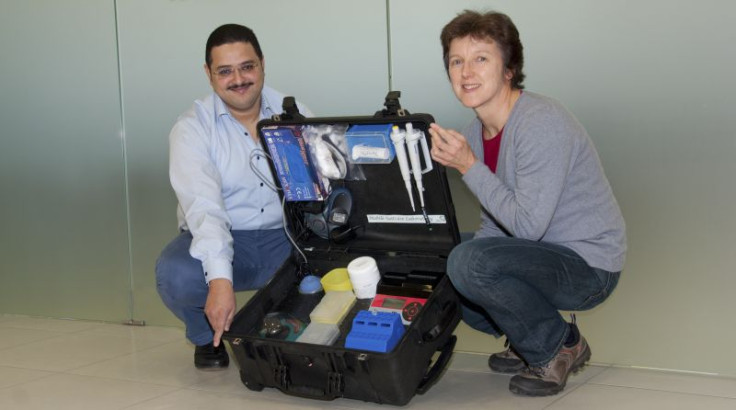Ebola: Suitcase kit detects virus in 15 minutes, as vaccine testing nears final stages

Researchers at DPZ, Germany, have developed a simple Ebola diagnostics kit that detects the virus in 15 minutes, without requiring any electricity, cold chain or lab equipment.
The diagnostics-in-a-suitcase that comes equipped with all the required reagents is operated by an integrated solar panel and a power pack.
The kit promises even faster detection than the Roche diagnostic test recently approved by FDA for emergency use.
The kit would be timely in detection of cases in remote parts of West Africa where electricity and lab equipment are scarce.
It will enter a field trial in Guinea in collaboration with the Institut Pasteur de Dakar, Senegal, the Public Health Institute of Guinea, the University of Stirling, Robert Koch Institute, and TwistDx Ltd.
Dr Ahmed Abd El Wahed, scientist in the Unit of Infection Models at DPZ, is credited with being the innovator of the suitcase laboratory.
Current tests use the real-time polymerase chain reaction (PCR) technique which can only be done in the lab and requires samples from the site to be transported.
The diagnostics-in-a-suitcase is based on Recombinase Polymerase Amplification (RPA) technology developed by TwistDx Ltd, a subsidiary of Alere Inc. RPA is as sensitive as PCR, but extremely rapid and does not require rapid heat-cycling equipment. The reagents used do not need cold storage either.
Meanwhile, WHO has said that final-stage trials of three experimental Ebola vaccines will begin in January or February in the worst-hit West African countries. Most of the vaccines have not exhibited any safety problems, reports Reuters.
Vaccine trials this month
Two vaccines from GlaxoSmithKline and another from a collaboration between NewLink Genetics and Merck started initial clinical testing in the autumn. A third one from Johnson & Johnson and Bavarian Nordic has just reached the human testing stage.
Johnson & Johnson says it has already made 400,000 regimens of its experimental vaccine and would have two million available for use in 2015, says NBC News.
Testing of the experimental drug brincidofovir on Ebola patients has commenced at one hospital in Liberia where patients are being given the option of taking part in the trial.
Nearly 90 experts from vaccine manufacturers, regulatory agencies and health ministries met at the WHO headquarters in Geneva to review data from initial safety trials and study prospects of a phase 3 trial.
Sierra Leone plans to start vaccine trials in the second half of January. The country has been the worst-hit in the recent outbreak.
However, the situation in Liberia is also worrisome with Ebola continuing in its capital Monrovia.
Cases are scattered throughout the city, making it hard to identify distinct chains of transmission, says WHO. There is also fear the virus has moved from cities to remote areas.
© Copyright IBTimes 2025. All rights reserved.





















